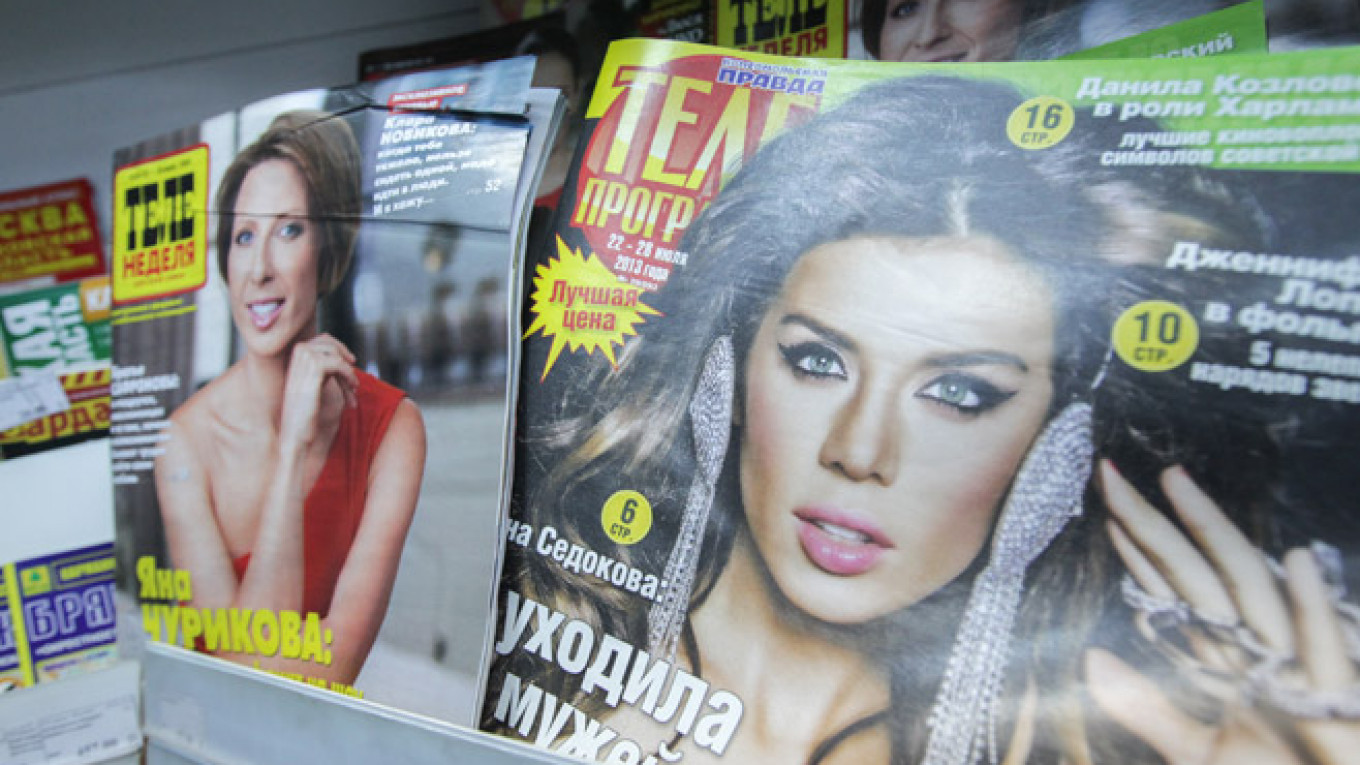As Russia marked its holiday honoring the press on Tuesday, the reality for most publishers was nothing worth celebrating.
The drastic slide in the value of the Russian ruble has put some publications on the edge of survival, with the cost of imported materials rising just as the economic crisis cuts off advertising revenues.
Most vital products used in the printing process — such as printing plates, chemicals and inks — are not produced domestically and must be imported from Europe. As the ruble fell more than 30 percent against the euro last year, production costs skyrocketed.
The government has taken notice. In an interview with Rossiiskaya Gazeta published this week, Deputy Communications and Press Minister Alexei Volin warned of the devastating effect that the ruble collapse could have on the printed press.
Unless the government takes steps to support papers, "we will have tens of thousands of unemployed journalists in 2015," Volin said.
While most publications have been impacted to some degree, it's glossy magazines that are bearing the brunt of the ruble's fall. Even the glossy paper from which they take their name has no Russian analogue.
A full 80 percent of the production cost of glossy magazines is priced in euros, said Jean-Emmanuel de Witt, CEO of Sanoma Independent Media, which fully or partly owns the Russian editions of such popular international magazines as Cosmopolitan, Esquire, Men's Health and National Geographic, as well as The Moscow Times.
"We are considering the possibility of changing the format of our magazines and the kind of paper without harming their quality. The most important thing is that our readers mustn't be affected," De Witt said.
Newspapers are better off than magazines, as suitable paper is produced domestically, said Gleb Prozorov, managing director of prominent business daily Vedomosti. Vedomosti's own iconic pink sheets are, unfortunately, produced in Switzerland, he added.
The sudden increase in production costs is just one more blow to the hard-pressed industry. In times of crisis, advertising budgets are traditionally one of the first things to go, and Russia's recent economic turmoil has been no exception.
The print advertising market fell 10 percent from January to September last year compared with the same period in 2013, according to the Association of Communication Agencies of Russia, and this year could bring worse.
"The fall [in 2015] could be colossal, up to 40 to 50 percent for glossy magazines," said Yelena Shitikova, managing director of Russia's Guild of Press Publishers, a publishing lobby.
As revenues fall, publishers are going to have to prioritize, according to Elmira Sabitova, media director at advertising agency Initiative.
"Publishing houses will place their bet on key publications and close down second-priority ones," Sabitova said. Women's magazines — some of which were able to maintain their 2013 budgets last year — will also stay in high demand among advertisers, she added.
But the disappearance of a whole raft of publications is hardly the most desirable outcome for the industry, which leaves politicians and lobbies searching for measures to buoy it up.
In his recent interview, Deputy Press Minister Volin called for "emergency measures to liberalize the advertising market" — including lifting a ban on advertising alcohol in the printed press that has been in place since 2013. The ban was amended this year to permit advertisements for Russian wine, but domestic wine is a tiny segment of the total Russian alcohol market.
The Guild of Press Publishers supports legalizing alcohol ads, but is also urging the government to lower or abolish customs duties on printing materials and adjust the Tax Code in publishers' favor.
Allowing print publications to publish alcohol ads would certainly help those that relied heavily on these ads before, such as Maxim and Snob, Sabitova said. The boost would be limited, however, as many other publications published few or no alcohol ads even before the ban.
To cope with higher costs, most publishers will be forced to either raise the retail price of their publications — striking a blow to sales in an environment of high inflation — or charge more for advertising.
Volin predicted that if the government doesn't commit to supporting the industry, retail prices could rise by 30 to 50 percent. Increases in advertising prices would be in the same range, according to Vedomosti's Prozorov.
Asked how newspapers and magazines are going to cope with the new economic reality, Prozorov laughed.
"Mankind has never invented a better solution than increasing revenues and cutting expenses," he said. "We don't have many choices."
Contact the author at [email protected]
A Message from The Moscow Times:
Dear readers,
We are facing unprecedented challenges. Russia's Prosecutor General's Office has designated The Moscow Times as an "undesirable" organization, criminalizing our work and putting our staff at risk of prosecution. This follows our earlier unjust labeling as a "foreign agent."
These actions are direct attempts to silence independent journalism in Russia. The authorities claim our work "discredits the decisions of the Russian leadership." We see things differently: we strive to provide accurate, unbiased reporting on Russia.
We, the journalists of The Moscow Times, refuse to be silenced. But to continue our work, we need your help.
Your support, no matter how small, makes a world of difference. If you can, please support us monthly starting from just $2. It's quick to set up, and every contribution makes a significant impact.
By supporting The Moscow Times, you're defending open, independent journalism in the face of repression. Thank you for standing with us.
Remind me later.






